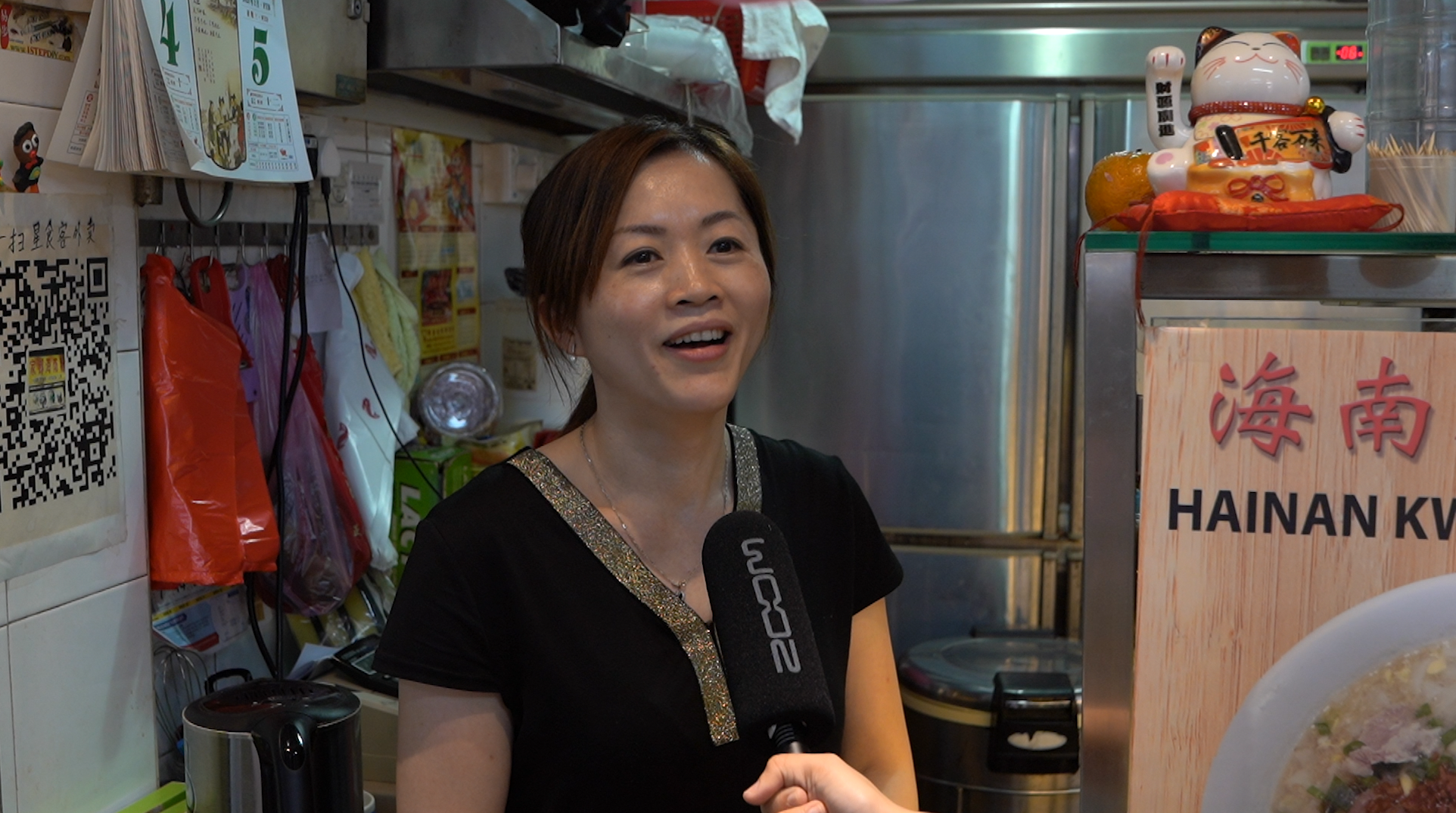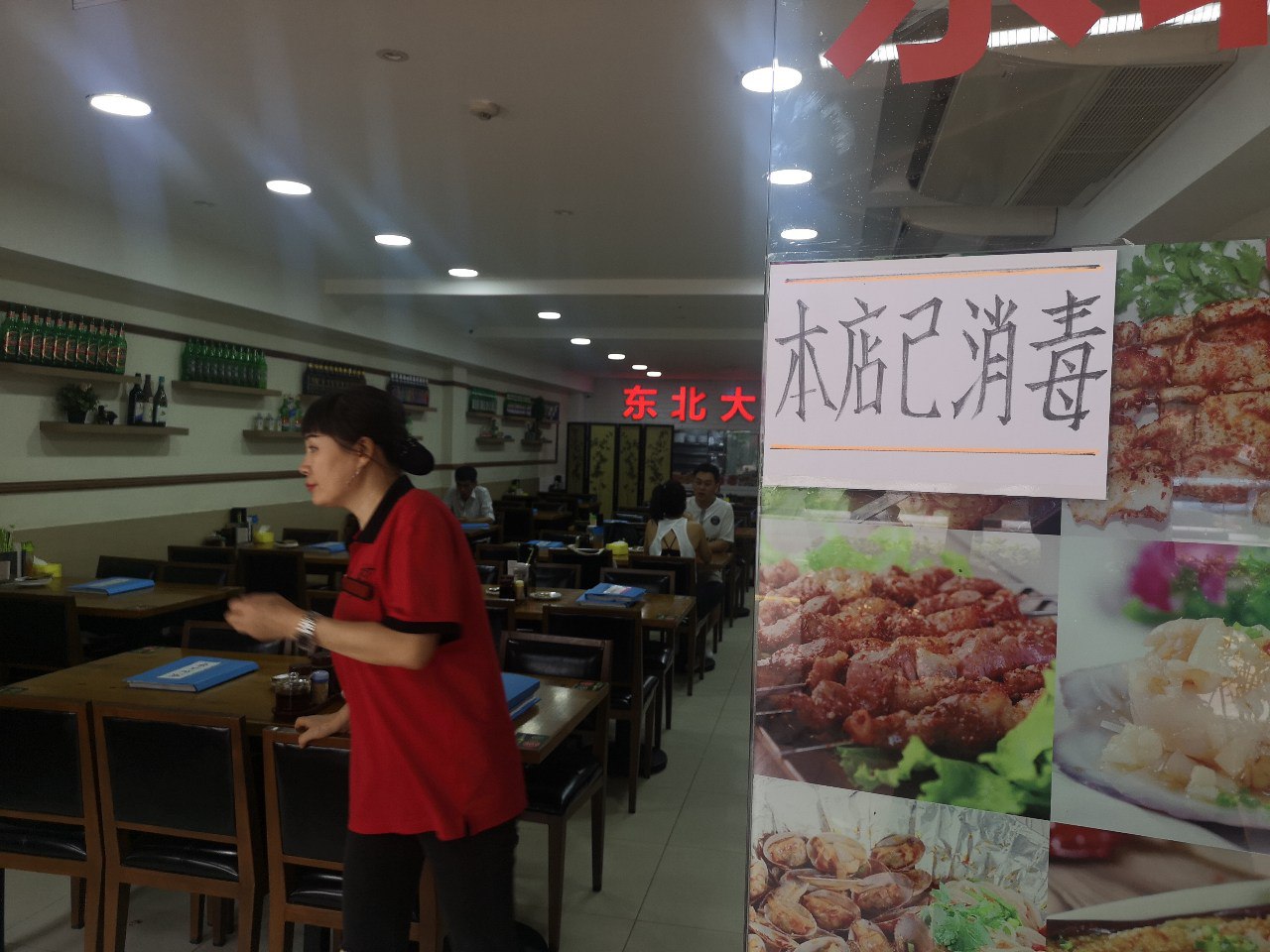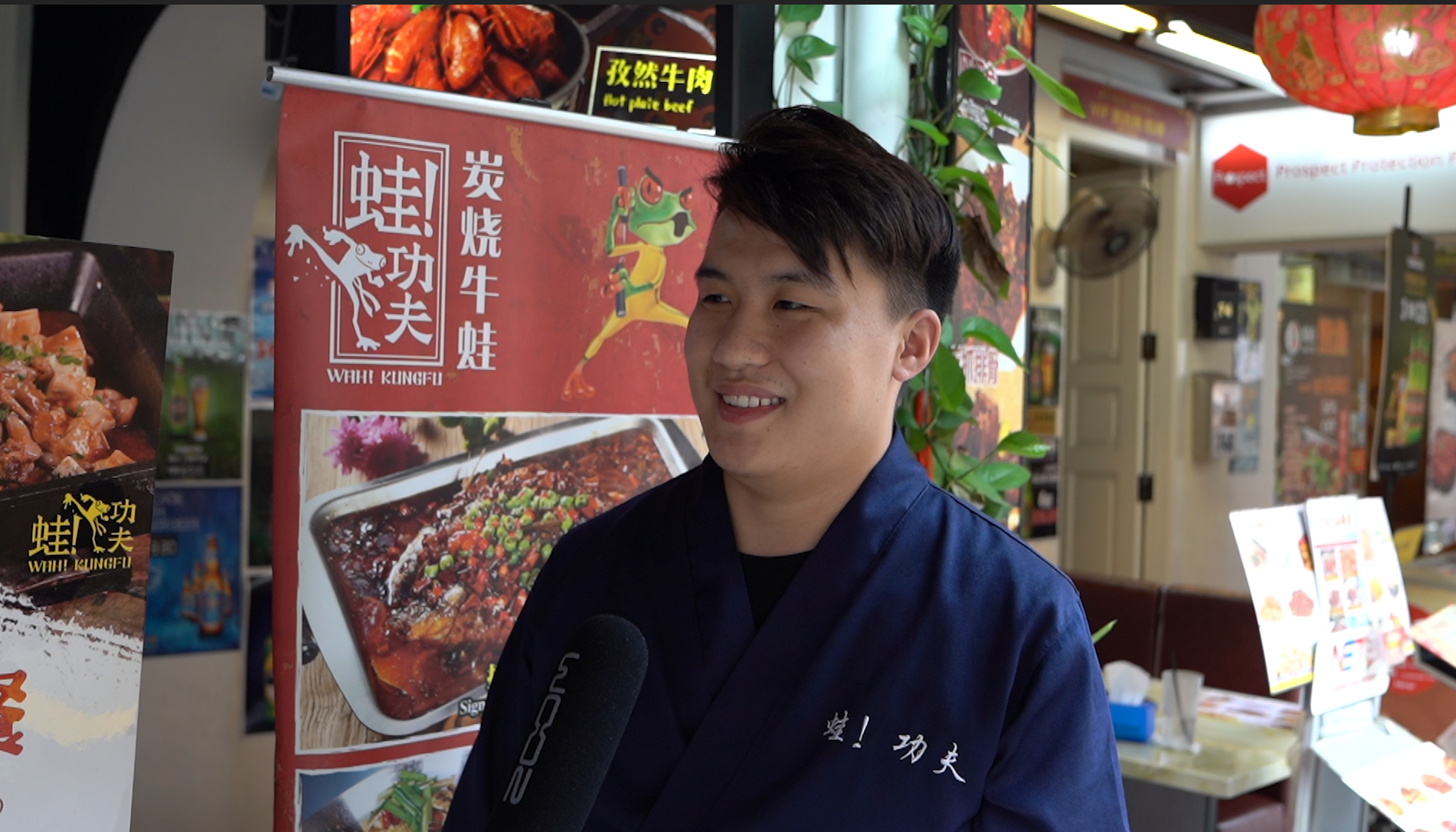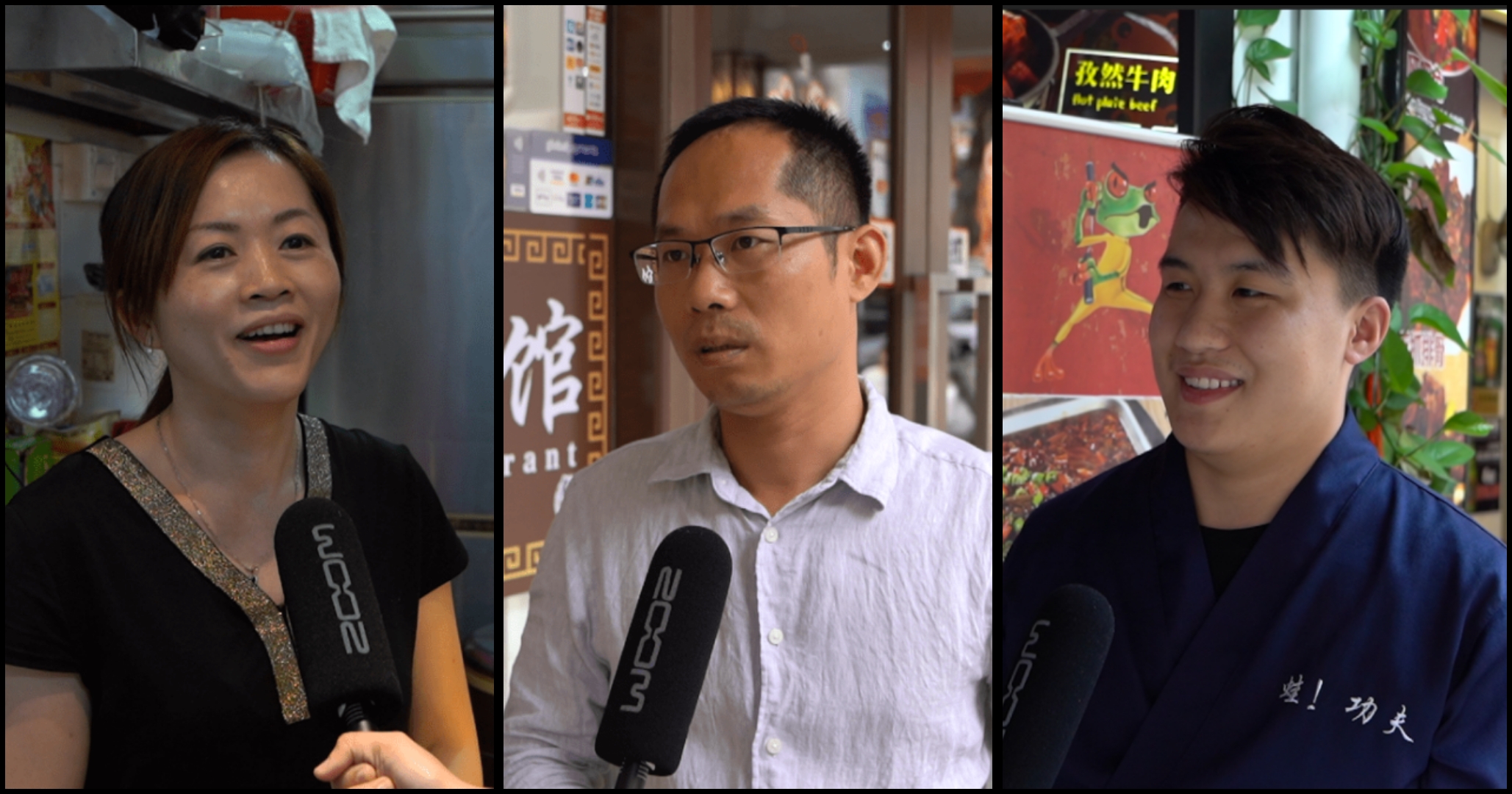Wenchang native Sylvia Zhang runs a stall called Hometown Hainan Fen at People's Park Hawker Centre.
It specialises in Hainan fen (海南粉) — a dish comprising thick bee hoon, bamboo shoots, peanuts, and beef drenched in a gooey meat sauce.
Possibly the precursor to the Hainanese Beef Noodle dish Singaporeans are more familiar with, Zhang's dish is as close as what you can get back in Hainan and it definitely has its fans.
But these days, sales of her Hainan fen have plunged by about 50 per cent, she said.
"The whole hawker centre has been affected, not just my stall."
Another hawker manning a mala xiang guo stall at People's Park also tells us with a sigh that she hasn't been able to sell one day's worth of food in the last three days.
"Maybe people are afraid of the coronavirus and are choosing to hide at home," she added.
 Demand for Zhang's Hainan fen has shrunk by about 50 per cent. Photo by Kane Raynard Goh
Demand for Zhang's Hainan fen has shrunk by about 50 per cent. Photo by Kane Raynard Goh
Empty streets in China and Singapore
And while the situation back in Zhang's hometown isn't severe (there is just one confirmed case at the time we're writing this — a Wuhan resident who was holidaying in Hainan) the mood there is equally sombre.
"It's very, very strict. The markets back in Wenchang are empty. Lots of businesses have closed while school classes have been postponed. A lot of food places have also closed."
Shoppers in Wenchang are also opting not to stay out in public for long, according to Zhang. "If they need to buy stuff, they will buy and quickly return home."
It's the same here in Singapore's Chinatown, said Zhang, who has has been in Singapore for more than a decade:
"The travel ban has definitely affected business here, especially the tour agencies and the F&B businesses," says Zhang "There are fewer people now. But I know the Singapore government enforced this temporary ban to prevent the spread of the virus."
When we asked if she is taking steps to protect herself, such as wearing a mask, Zhang said:
"I don't wear a mask here. You see the air (in the stall) doesn't move and it's so hot here. If I keep wearing a mask during work, not sick will also become sick."
 Many restaurants in Chinatown are plastered with signs like this, assuring customers that their premises have been disinfected. Image by Joshua Lee.
Many restaurants in Chinatown are plastered with signs like this, assuring customers that their premises have been disinfected. Image by Joshua Lee.
Wasted ingredients and empty restaurants
Across the road along Pagoda Street, Shandong native Liu works in an eatery that specialises in Hunan char-grilled frog legs, a favourite among Chinese tourists.
His shop, Wah Kungfu, has seen a drop of at least 70 per cent in business thanks to the fall in foot traffic — both local and foreign — out on the streets.
"A lot of the ingredients that we bought in anticipation of the Chinese New Year demand was wasted," he says.
Unlike Zhang, Liu works in an air-conditioned restaurant and wears a mask, even though he is not sick.
"It makes us feel safer because we see people from different places, and it's also a kind of responsibility to our customers."
Over at Mosque Street, business owners tell Mothership that the place has become a ghost street ever since the travel restrictions kicked in.
Kong Fan Long, another Shandong native, had a rather grim start to the new year.
The owner of Chunqiu Restaurant, which sells Shandong cuisine, had to cancel all his orders after Chinese New Year and estimates that he has lost at least 95 per cent of his business.
 Kong from Shandong is faced with the possibility that his business might wind up due to poor business. Photo by Kane Raynard Goh
Kong from Shandong is faced with the possibility that his business might wind up due to poor business. Photo by Kane Raynard Goh
"I'm just losing so much money every day," he said, a little helplessly.
When we visited his restaurant in the afternoon, the place was empty saved for two filled tables.
"These are my friends," he adds, a little sheepish.
There's absolutely no way that his restaurant can continue like this. "If it does, I might need to close it and move back to China," says Kong.
And while the drop in tourist numbers is largely due to the travel restrictions imposed on PRC travellers, all three don't see it as a discriminatory move against the Chinese.
All agreed that it's a good and necessary measure for Singapore's safety.
Kong says:
"I don't think people are discriminated by their race or country in Singapore. Whatever your skin colour or country or origin, we're all the same. It's just that during this critical time, it's best to restrict travel for the safety of the country."
"Nobody wanted this to happen"
As the coronavirus spread further outside of China, people are increasingly airing their prejudiced sentiments against Chinese nationals — not just around the world but in Singapore as well.
A not-too-recent petition to ban PRC visitors from entering Singapore revealed ugly sentiments, like this one calling on Chinese nationals to "behave like decent human beings instead of dogs"

"Nobody wanted this to happen" was a common refrain we heard from our interviewees.
"You can't just put the blame all on Chinese people, or target a specific group of people for this calamity, which can happen to anyone," said Kong. "This is not right."
 A virus doesn't define a city, said Shandong native Liu. Photo by Kane Raynard Goh
A virus doesn't define a city, said Shandong native Liu. Photo by Kane Raynard Goh
It's a sentiment Liu echoes.
"A virus may erupt from a particular city or place but it does not define it," he said, adding that people shouldn't be pointing fingers, but caring for each other and fighting the outbreak instead.
Zhang pointed out that while people are blaming the virus on bat-eating (or even snake-eating) Chinese, the origins of the virus have not actually been determined:
"Actually we can't blame the Wuhan people. They're suffering right now, so much more than us. We shouldn't be so negative towards people from mainland China. After all, nobody wanted this to happen."
Lending a helping hand
While others might stand idly by, Zhang is putting her words into action by supplying her tenants with a place to serve out their Leaves of Absence.
When her tenants returned from mainland China after Chinese New Year, Zhang moved her family to a friend's place so her tenants don't need to worry about any risk of spreading any illnesses they may have brought back to Singapore.
"Most folks from China rent places in Singapore. If I chase them out, where can they go?" she said.
Zhang's gesture stands out amid stories of landlords chasing out their tenants who have to serve their Leaves of Absence or are quarantined.
She also isn't at all worried that her tenants might be infected with the coronavirus:
"I do ask them how they are doing. And since I already chose to let them stay in my place, there's no use worrying too much."
Watching his countrymen suffer is a particularly painful experience for Kong, who says he feels powerless to help them from all the way down here: "I just wish for it to end."
And while he is quite assured that his family back home in Shandong is quite safe ("Shandong is quite far from Wuhan, and my city took early precautions to seal itself from outsiders"), the same cannot be said of his family.
"Of course they worry about me. Every day we talk over video calls. They ask me if I'm OK, and try to find out more about the situation in Singapore. And when I informed them that there were no new cases the last two days (Feb. 2 - 3), they were very relieved."
Three days after our expedition to Chinatown, though, the situation has changed. A flurry of more than 10 new cases were announced, community spread has been confirmed, and now the Singapore government has raised its Disease Outbreak Response System Condition (DORSCON) to Orange.
https://mothership.sg/2020/02/coronavirus-dorscon-orange-1st-time/?utm_source=tele
The resultant panic-buying across supermarkets is the clearest sign that Singaporeans are bracing themselves for more uncertainty.
It is an uncertainty that is equally shared by local food & beverage businesses. But for PRC workers in particular, it is compounded by the fear and anxiety they feel for China.
In a way, just as their countrymen are fighting back home, they too are struggling for a lifeline.
"We just have to try to remain calm and continue on with everyday life. Life has to go on after all," said Zhang.
Stories of Us is a series about ordinary people doing extraordinary things. Be it breaking away from conventions, pursuing an atypical passion, or making the world a better place in their own small way, these stories remind us both of our individual uniqueness and our collective humanity.
Top photos by Kane Raynard Goh
If you like what you read, follow us on Facebook, Instagram, Twitter and Telegram to get the latest updates.
